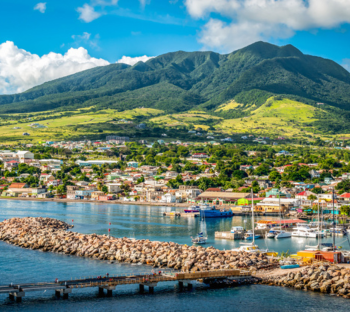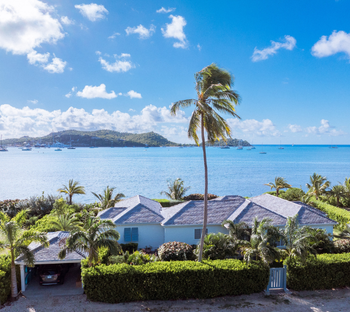The Caribbean has long been a sought-after destination for real estate investors, particularly high-net-worth individuals looking for exclusive properties, strong investment returns, and opportunities for second citizenship.
With their stunning coastlines, favorable tax laws, and government-backed citizenship by investment (CBI) programs, countries like Antigua and Barbuda, Dominica, Grenada, St. Kitts and Nevis, and St. Lucia offer several reasons to invest in real estate.
If you’re thinking of entering the Caribbean property market, this guide will walk you through everything you need to know about how to get into real estate investing. But before proceeding to the steps in real estate investing for beginners, let’s go over some basics about Caribbean real estate first.
Why the Caribbean Is a Magnet for Real Estate Investors
Investing in Caribbean real estate goes beyond acquiring a beachfront villa or luxury apartment. Many investors are drawn to the region because of its investor-friendly policies, stable economies, and booming tourism industry.
Properties in prime locations can generate significant rental income, especially in areas with high tourism demand. Moreover, many Caribbean nations offer favorable tax structures, with no capital gains, inheritance, or wealth tax. These conditions make real estate an efficient asset to hold.
For those looking to enhance their global mobility, some Caribbean nations allow foreign investors to secure citizenship through real estate purchases. This provides visa-free travel to numerous countries and potential tax advantages for those seeking alternative residency options.
Steps in Real Estate Investing for Beginners
Now, it’s time to get to the nitty-gritty of how to invest or buy real estate in the Caribbean.
Below are easy-to-follow steps:
1. Define your investment goals.
Before asking how much money you need to start investing in real estate or making any purchases, consider whether your primary goal is to secure second citizenship, earn rental income, or own a Caribbean vacation home.
Knowing your reason for wanting to invest will help you choose the right country and type of property that aligns with your financial goals.
2. Research the best locations.
Remember the importance of location, location, location. It’s true; when it comes to real estate, one’s success in investing hinges a lot on a property’s location. Do some research on the real estate trends in each country.
Some locations are better suited for high-end luxury rentals, while others offer strong returns on eco-friendly developments or boutique hotels. Find out about market demand, rental yields, and potential appreciation rates before deciding where to invest.
3. Choose the right property.
Based on your research, you can narrow down your choices to properties based on market demand, resale potential, and eligibility for CBI (if this is a primary goal for you). Government-approved projects often include resort developments and condominiums, and these can provide stable returns with the right managed rental program.
4. Work with a trusted real estate agent or developer and legal advisor.
For neophytes, real estate investing can seem complicated. And things can get doubly difficult when you plan on investing in a foreign country. For sure, you’ll need some form of professional guidance locally.
Working with licensed real estate agents or known developers with proven track records and legal experts specializing in Caribbean property transactions could work to your advantage. They can help you identify real estate investment opportunities and, more importantly, with due diligence, ensure compliance with local regulations and facilitate the purchasing process.
5. Understand all legal and financial considerations.
Each Caribbean nation has its own set of regulations regarding property ownership, taxes, and fees. In addition to knowing the minimum investment threshold (if you’re applying for CBI) and the real estate purchase price, you’ll have to budget for additional costs, such as government processing fees, legal fees, and annual maintenance charges.
Some countries impose resale restrictions to maintain the integrity of their CBI programs, so you must understand these conditions before committing to a property (whether you want to invest in rental property or something else).
6. Submit a citizenship application (if applicable).
If your investment is tied to a CBI program, you’ll need to complete the application process, which includes submitting financial documents, undergoing background checks, and paying the necessary fees.
The approval timeline varies by country but typically ranges from three to six months. Once granted, citizenship offers long-term benefits, including tax advantages and better global mobility.
How Citizenship by Investment Programs Benefit Real Estate Investors
Many Caribbean nations have introduced CBI programs that allow investors to get a second citizenship by purchasing property that meets government-approved criteria. These programs are especially appealing to those who wish to enjoy greater mobility in international travel and seek business opportunities and financial security.
Although each country usually has different requirements, the process generally involves investing in designated real estate projects, being subjected to due diligence checks, and submitting a citizenship application.
The minimum investment thresholds depend on the country you’re eyeing, with some starting at $200,000. Investors are usually required to hold the property for a specific number of years before selling to ensure that the market remains stable and attractive for long-term buyers.
Mitigating Risks in Caribbean Real Estate Investment
Like any investment, buying property in the Caribbean comes with risks.
Market fluctuations can affect property values, so it’s wise to invest in well-established locations with historically high demand. Liquidity can also be a concern since some CBI properties have resale restrictions.
To avoid scams, only purchase from government-approved developers and conduct thorough due diligence before finalizing any deal or real estate transaction.
Investing in Caribbean real estate provides buyers the rare opportunity to own high-value properties, generate rental income, and gain second citizenship.
With proper planning, professional guidance, and a clear understanding of the regulations in the country you intend to invest in, you can maximize your returns while enjoying the benefits of a Caribbean lifestyle.
If you’re looking to own Caribbean real estate via the citizenship by investment route, get in touch with us at Citizens International.
Our dedicated investment advisors can help you find a new home or investment property in government-approved locations.


